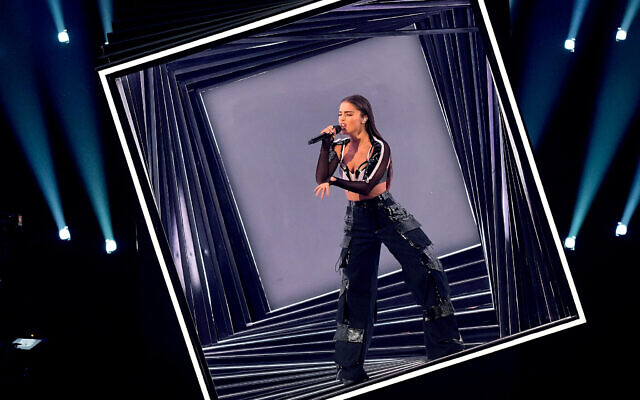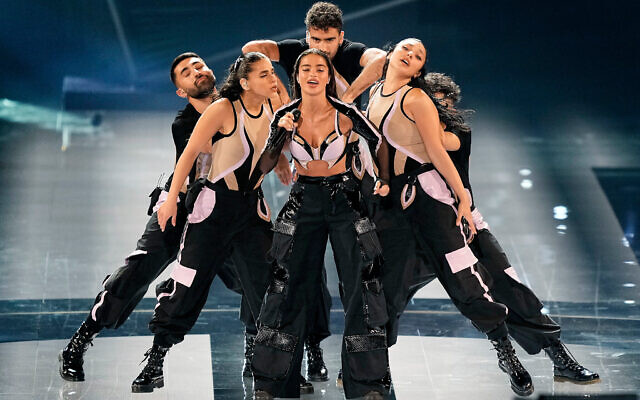Israel’s Noa Kirel rides Unicorn to Eurovision grand final
Pop singer says she did the ‘maximum to represent the country with pride’ at international song contest in Liverpool. She will compete for the top prize on Saturday night.

Israel’s Noa Kirel has advanced to the grand final of the 2023 Eurovision in Liverpool following her performance during the contest’s first semifinal.
Singing and dancing to her poppy offering Unicorn, Kirel garnered enough votes to qualify to compete for the top prize on Saturday night.
“There is no excitement quite like this!” Kirel said in a statement from the Kan public broadcaster after the results were announced. “I felt like every one of you was with me. I promise to do everything — and I mean everything — to keep making the people of Israel happy in the grand final.”
Kirel’s song, which she co-wrote alongside Doron Medalie, Yinon Yahel and May Sfadia, lauds “the power of the unicorn, out here on my own,” which the singer has said is a message of acceptance and self empowerment.
“The electricity in the crowd provided us with so much energy to do the maximum to represent the country with pride,” said Kirel after finishing her performance, according to Kan. “We gave it our all and the feeling was incredible. Thank you to everyone, I feel like you’re with me.”
Also moving ahead to the final on Tuesday were Croatia, Moldova, Switzerland, Finland, the Czech Republic, Portugal, Sweden, Serbia and Norway. Meanwhile, the Eurovision hopes of Malta, Latvia, Ireland, Azerbaijan and Netherlands came to an end Tuesday night.

Kirel took the stage just hours after Israel launched a military operation in Gaza, leading some to fear that the negative attention would affect her chances given the contest’s history of politicised voting.
Ahead of the contest, Kirel issued a statement saying that “security is the most important thing at the moment, and I hope that the contest will hearten citizens of Israel. My heart is with them, and I will do everything I can so that the people of Israel are proud of me.”
Kirel’s Eurovision “postcard,” which introduces each contestant, was filmed at Masada, and shows the singer posing and dancing atop the historical landmark.
Oddsmakers have predicted that Kirel will finish in 7th place this year, which would be the best showing for Israel since Netta Barzilai won with Toy in 2018. Last year’s Israeli contestant, Michael Ben-David, failed to qualify for the grand final — a first for Israel in eight years.
In a new voting change unveiled this year, the semifinal rounds are being judged solely by the televote — votes cast by fans via SMS, phone or app. And for the first time, residents of countries which are not competing in the contest were also eligible to vote, with all such votes tallied up together with the weight of an additional country.
The full breakdown of the voting in the semifinal rounds will not be revealed until after a winner is crowned this weekend.
Those who qualified will compete in Saturday’s grand final against the acts which advance from Thursday’s semifinal, last year’s winner Ukraine and the Big Five: the UK, Germany, France, Spain, Italy.
Sweden’s Loreen, with her power ballad Tattoo, is considered the heavy favourite to win this year’s contest, which is being held in the UK after the European Broadcasting Union decided that last year’s winner, Ukraine, could not safely host.
Tuesday evening’s broadcast paid tribute to Ukraine repeatedly throughout the show, including with Ukrainian singers performing in interval performances, videos and a Ukrainian co-host.
Israel picked Kirel to represent the country via an internal selection committee, marking a change from the past eight years, in which the contestant was selected via reality TV competitions. After years of sending another amateur to the contest, the Kan public broadcaster asked Kirel, one of Israel’s most popular current singers, to bring her star power to the international competition.
Israel has won the Eurovision Song Contest four times since it began taking part in 1973: first in 1978 with A-Ba-Ni-Bi by Yizhar Cohen; then a year later with Hallelujah by Gali Atari and Milk and Honey; again in 1998 with Diva by Dana International and most recently in 2018 with Barzilai’s Toy.
Times of Israel

comments